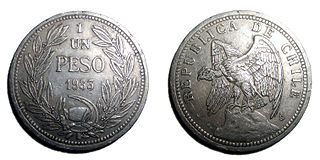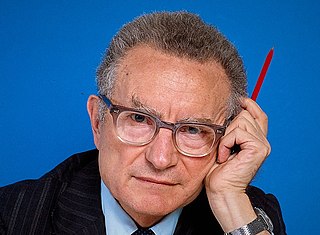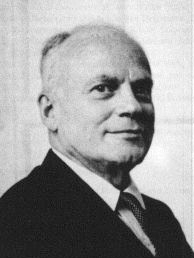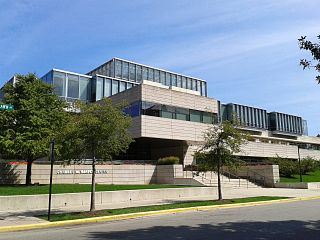Related Research Articles

Milton Friedman was an American economist and statistician who received the 1976 Nobel Memorial Prize in Economic Sciences for his research on consumption analysis, monetary history and theory and the complexity of stabilization policy. With George Stigler, Friedman was among the intellectual leaders of the Chicago school of economics, a neoclassical school of economic thought associated with the work of the faculty at the University of Chicago that rejected Keynesianism in favor of monetarism until the mid-1970s, when it turned to new classical macroeconomics heavily based on the concept of rational expectations. Several students, young professors and academics who were recruited or mentored by Friedman at Chicago went on to become leading economists, including Gary Becker, Robert Fogel, and Robert Lucas Jr.

Ronald Harry Coase was a British economist and author. Coase was educated at the London School of Economics, where he was a member of the faculty until 1951. He was the Clifton R. Musser Professor of Economics at the University of Chicago Law School, where he arrived in 1964 and remained for the rest of his life. He received the Nobel Memorial Prize in Economic Sciences in 1991.

Gary Stanley Becker was an American economist who received the 1992 Nobel Memorial Prize in Economic Sciences. He was a professor of economics and sociology at the University of Chicago, and was a leader of the third generation of the Chicago school of economics.

The Chicago Boys were a group of Chilean economists prominent around the 1970s and 1980s, the majority of whom were educated at the Department of Economics of the University of Chicago under Larry Sjaastad, Milton Friedman, and Arnold Harberger, or at its affiliate in the economics department at the Pontifical Catholic University of Chile. After they finished their studies and returned to Latin America, they adopted positions in numerous South American governments including the military dictatorship of Chile (1973–1990), as economic advisors. Many of them reached the highest positions within those governments. Ronald Reagan and Margaret Thatcher were influenced by Chile's policies and economic reforms.

Paul Anthony Samuelson was an American economist who was the first American to win the Nobel Memorial Prize in Economic Sciences. When awarding the prize in 1970, the Swedish Royal Academies stated that he "has done more than any other contemporary economist to raise the level of scientific analysis in economic theory".

Law and economics, or economic analysis of law, is the application of microeconomic theory to the analysis of law. The field emerged in the United States during the early 1960s, primarily from the work of scholars from the Chicago school of economics such as Aaron Director, George Stigler, and Ronald Coase. The field uses economics concepts to explain the effects of laws, assess which legal rules are economically efficient, and predict which legal rules will be promulgated. There are two major branches of law and economics; one based on the application of the methods and theories of neoclassical economics to the positive and normative analysis of the law, and a second branch which focuses on an institutional analysis of law and legal institutions, with a broader focus on economic, political, and social outcomes, and overlapping with analyses of the institutions of politics and governance.
The Chicago school of economics is a neoclassical school of economic thought associated with the work of the faculty at the University of Chicago, some of whom have constructed and popularized its principles. Milton Friedman and George Stigler are considered the leading scholars of the Chicago school.

Jacob Viner was a Canadian economist and is considered with Frank Knight and Henry Simons to be one of the "inspiring" mentors of the early Chicago school of economics in the 1930s: he was one of the leading figures of the Chicago faculty. Paul Samuelson named Viner as one of the several "American saints in economics" born after 1860. He was an important figure in the field of political economy.

The University of Chicago Booth School of Business is the graduate business school of the University of Chicago, a private research university in Chicago, Illinois. Founded in 1898, Chicago Booth is the second-oldest business school in the U.S. and is associated with 10 Nobel laureates in the Economic Sciences, more than any other business school in the world. The school has the third-largest endowment of any business school.

Oskar Ryszard Lange was a Polish economist and diplomat. He is best known for advocating the use of market pricing tools in socialist systems and providing a model of market socialism. He responded to the economic calculation problem proposed by Ludwig von Mises and Friedrich Hayek by claiming that managers in a centrally-planned economy would be able to monitor supply and demand through increases and declines in inventories of goods, and advocated the nationalization of major industries. During his stay in the United States, Lange was an academic teacher and researcher in mathematical economics. Later in socialist Poland, he was a member of the Central Committee of the Polish United Workers' Party.

George Joseph Stigler was an American economist. He was the 1982 laureate in Nobel Memorial Prize in Economic Sciences and is considered a key leader of the Chicago school of economics.

Lars Peter Hansen is an American economist. He is the David Rockefeller Distinguished Service Professor in Economics, Statistics, and the Booth School of Business, at the University of Chicago and a 2013 recipient of the Nobel Memorial Prize in Economics.

James Laurence Laughlin was an American economist and professor at Cornell University, Harvard University, and the University of Chicago, who helped to found the Federal Reserve System and was "one of the most ardent defenders of the gold standard."

EconTalk is a weekly economics podcast hosted by Russ Roberts. Roberts, formerly an economics professor at George Mason University, is a research fellow at Stanford University's Hoover Institution. On the podcast, Roberts typically interviews a single guest—often professional economists—on topics in economics. The podcast is hosted by the Library of Economics and Liberty, an online library sponsored by Liberty Fund. On EconTalk Roberts has interviewed more than a dozen Nobel Prize laureates including Nobel Prize in Economics recipients Ronald Coase, Milton Friedman, Gary Becker, and Joseph Stiglitz as well as Nobel Prize in Physics recipient Robert Laughlin.
The Institute for New Economic Thinking (INET) is a New York City–based nonprofit think tank. It was founded in October 2009 as a result of the Great Recession, and runs a variety of affiliated programs at major universities such as the Cambridge-INET Institute at the University of Cambridge.

Franklin "Frank" J.B. Stilwell is an Australian political economist and Professor Emeritus. He is known for establishing, with Evan Jones, Gavan Butler, Margaret Power, Debesh Bhattacharya, Geelum Simpson-Lee and Ted Wheelwright, an independent political economy department at the University of Sydney. His research interests include theories of political economy, inequality, urbanization, and regional development, Australian economic policy and the nature of work. His textbooks on the subject are standard teaching material for all university students in Australia studying the field of Political Economy. Stilwell's contribution to heterodox economics makes him a noteworthy figure of the Australian New Left.

The Gary Becker Milton Friedman Institute for Research in Economics is a collaborative, cross-disciplinary center for research in economics. The institute was established at the University of Chicago in June 2011. It brought together the activities of two formerly independent economic research centers at the university: the Milton Friedman Institute for Research in Economics and the Becker Center on Chicago Price Theory.

Konstantin Sonin is a Russian economist. He is a professor at the University of Chicago Harris School of Public Policy, research fellow at the Centre for Economic Policy Research (CEPR), London, and an associate research fellow at the Stockholm Institute of Transition Economics. In recognition for his outstanding research in the field of political economy, in December 2015, he was named the John Dewey Distinguished Service Professor of the University of Chicago.

David I. Meiselman was an American economist. Among his contributions to the field of economics are his work on the term structure of interest rates, the foundation today of the implementation of monetary policy by major central banks, and his work with Milton Friedman on the impact of monetary policy on the performance of the economy and inflation.
References
- ↑ "University of Chicago economists to focus their pioneering research in new institute honoring the memory of Milton Friedman". May 15, 2008.
- ↑ "Archived copy". Archived from the original on 2011-08-07. Retrieved 2011-06-18.
{{cite web}}: CS1 maint: archived copy as title (link) - ↑ "Becker Friedman Institute established at University of Chicago". June 17, 2011.